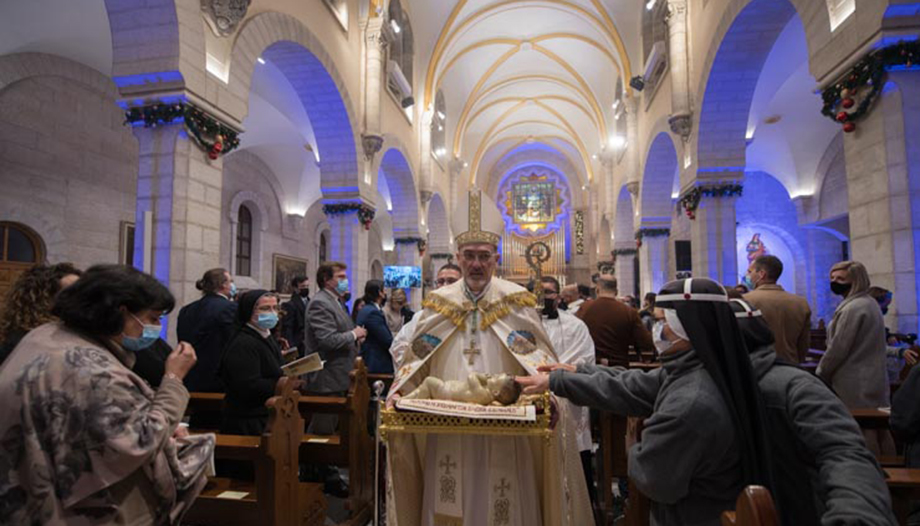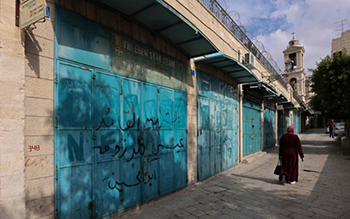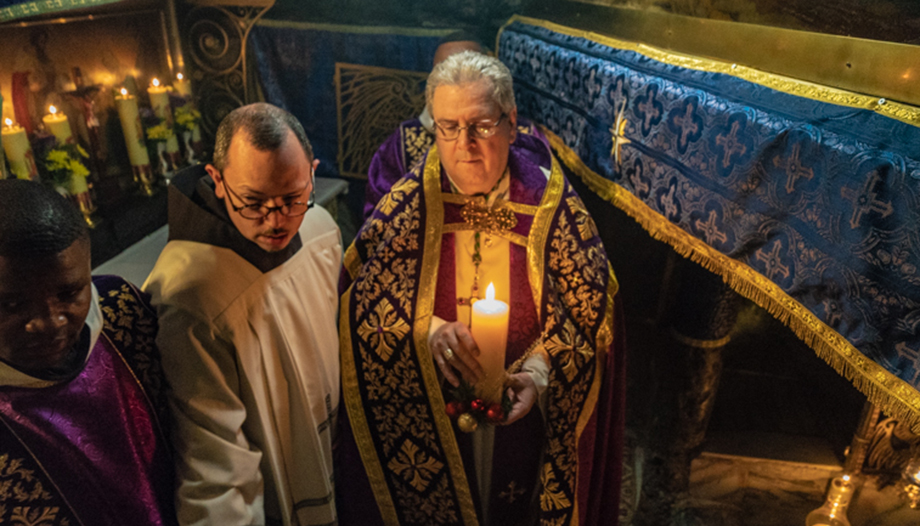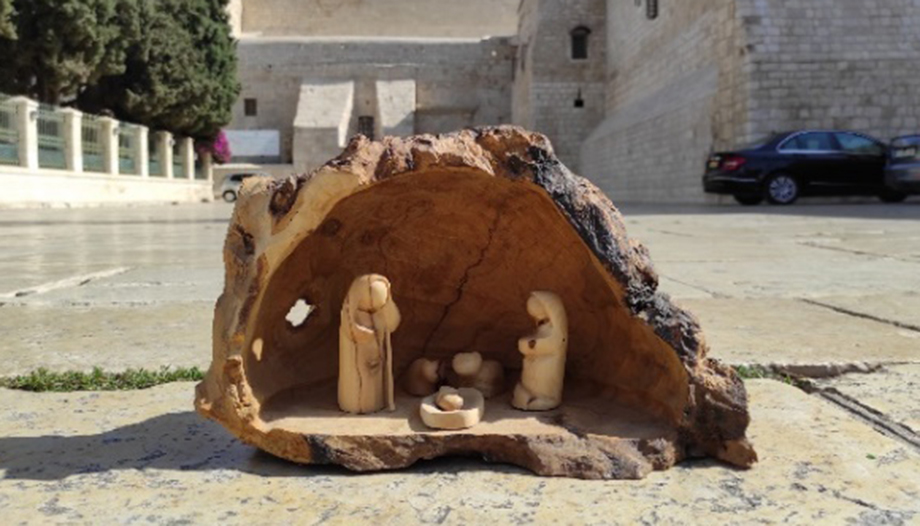Friar Luis Enrique Segovia Marín, OFM, is the superior of the Convent of St. Catherine "ad Nativitatem" in Bethlehem, in the Franciscan Custody of the Holy Places. He is part of the community in charge of guarding the place where Jesus was born. Today, Bethlehem is a small town, close to Jerusalem, where only 2% of the population is Catholic Christian. Hit by violence in recent years, the absence of pilgrimages due to the pandemic has made the harsh living conditions of this Palestinian Christian community in Bethlehem even more difficult.
Omnes was able to talk toLuis Enrique Segovia, who points out the need to support the presence of the Christian community in the birthplace of Christ in order to continue to be "living stones" of the faith.
- Every year, the whole world contemplates "a Bethlehem" on these feasts... How is the feast of the Nativity of Our Lord lived where He was born? How is the liturgy of Christmas Eve and the day of the Nativity celebrated?
In Bethlehem, the place where Jesus was born, every year, everyone waits with joy in the Manger Square and its surrounding streets, adjacent to the Basilica of the Nativity.
Neighbors, visitors and locals welcome the Catholic authority with joy and Christmas songs, while local bands of boyscouts and rows of friars, who come from all the communities of the Custody, make way for the procession amidst the sound of drums and applause from the local people.
The celebrations properly begin in November, on the last Saturday of the month, the first Sunday of Advent, in which four candles are lit in the Grotto of the Nativity and, symbolically, they are moved to the four cardinal points. With this celebration we point out that Mary is, in a certain way, the mother who prepares for the birth It is a remote preparation, that is the meaning of this ritual.
In Bethlehem we also celebrate Catholic Christmas on December 25, Orthodox Christmas on January 7 and Armenian Christmas on January 18. We have three Christmases, so we are not talking about Christmas Day but the Christmas season. This creates a beautiful mosaic of people, joined by Muslims, who join our joy on this holiday.
However, the days when everyone in Bethlehem unites in celebration are December 24 and 25. On December 24, the Latin Patriarch, Bishop Pierbattista Pizzaballa, Latin Patriarch of Jerusalem, the highest representative of the Catholic Church in the Holy Land, performs a procession between his see in Jerusalem and Bethlehem, signaling the beginning of the liturgical acts of Christmas.

- The presence of Christians in the Holy Land remains a challenge today. What is the life of the Catholic community in Bethlehem?
Bethlehem, the town where most Christians believe Jesus was born, becomes for many a place of pilgrimage during Christmas celebrations.
However, the number of Christians living there is decreasing. It is estimated that one hundred years ago about 40% of Bethlehem's population was Christian. Now the majority is Muslim and only about 2% of the Palestinian residents profess the faith of Christ.
Political and economic instability has pushed them to migrate to more prosperous places and, for this reason, the small community that still remains wants to be known and seeks support in order to prevent Christianity from disappearing precisely from the place where Jesus Christ lived and founded the Church.
The city of Bethlehem is mostly composed of Muslims, which is more than 95% and the rest are Christians. The reason: many of them have had to emigrate out of the territory, looking for better living conditions and a more secure future for their children.
Life for local people is unpredictable. You don't know when there will be a war, an intifada, an aggression or violence in general. Those who have experienced this do not want it for their children, but on the contrary, they want them to live in a calm, peaceful, serene way.
The Custody of the Holy Land has the great challenge of maintaining the presence of Christians in the Holy Land, because there is the fear that, over time, our churches and shrines will become museums because the living stones are, and always will be, the Christians.
- The Covid pandemic has hit the Holy Land in one of its main sources of livelihood: the pilgrims. How are they coping with this crisis? Do they feel spiritually accompanied by their brothers and sisters in faith?
If there is one thing that the coronavirus has brought, besides death, it has been the restriction of mobility. For this reason, tourism has been one of the sectors hardest hit by the pandemic. This has affected the Christians of the Holy Land, especially the city of Bethlehem, which is mainly and professionally dedicated to pilgrimages and which, having been completely suppressed, are still having a really hard time.

Tourism is the main driver of Bethlehem's economy, and had its peak at Christmas time and Easter. The people living there, a whopping 80% of them, depend on tourism for their income and have now been without any income.
For the second year, the hotels, restaurants and religious stores, which at this time of the year host a large part of their clientele, are part of a deserted city. All is silence and desolation. There is no expectation that this can change, the economic losses are many and everything is paralyzed.
In the city center, many stores and restaurants remain unopened in the absence of tourists. Only the local population can be seen walking through the streets.
In the religious sphere, most Christmas events and celebrations will continue to be limited to a small number of people, depending on the infection rate.
The celebrations must be carried out under strict hygiene measures, priority will be given to "remote" monitoring and they will be broadcast virtually and on television to prevent meetings and avoid the risk of contagion.
Tourism is the main driver of Bethlehem's economy, and had its peak at Christmas time and Easter. The people living there, a whopping 80% of them depend on tourism for their income and now they have been without any income.
Luis Enrique Segovia Marín, OFM.
- The presence of the Franciscan Custody is key for the Holy Land to remain the Holy Land and to be a place of pilgrimage and encounter with God.
The Franciscan Custody of the Holy Land has existed for 800 years and has always taken up the challenges facing our Christian faithful.
Over the years, the Custody has built hundreds of apartments for our Christian families in Judea and Galilee. During this pandemic, all of our Christian families were confined to their residences, which caused severe financial problems. In a gesture of solidarity, the Custody forgave the monthly rent payments for their apartments for one year. In addition, the Custody accompanies families in difficult economic situations or with health problems.
During this period of pandemic, God's providence has never failed us to do these works of charity. I must say "the Lord is also with us".. When we are together, so happy, the Lord is with us, he is also with us when we have moments of difficulty. He never abandons us, he is always near us.
We may or may not see it, but it always accompanies us on life's journey, especially in the bad times.
Second, the Franciscan Custody decided not to close the schools and classes will continue. on line for our students; our parishes have continued to provide social and health support to many families, providing food baskets for the indigent and for the many families in their respective parishes.
The Basilica of the Nativity is also a parish, administered by the Franciscans, and is the central place of the Christian community of Bethlehem. Like all places of prayer, it has been open since the beginning of November. Christians are welcome to come to the church, subject to health and safety precautions.

- What is the relationship of the Catholic community and, specifically, of the Franciscans, with other religious communities, Muslims and other Christians with whom they live?
It is very serene and respectful, because religions do not have to be the wall that separates people or societies.
However, there is a reality that we must not forget and that is that the presence of Christians in the Holy Land is decreasing every year at a dizzying rate.
The Custody has social projects to support Christian families, builds houses and schools and takes care of university education. Everything that is possible in favor of Christian families. But, if there is no awareness of wanting to stay and be missionary in their own land, everything we do will not be enough. That is why Christians have a special mission to transmit the faith to us.
There is the fear that, with time, our churches and sanctuaries will become museums, because the living stones are and will be the Christians.
Luis Enrique Segovia Marín, OFM.
Despite the pandemic situation we continue to live in, our presence has continued in the holy places of our redemption. At the Holy Sepulcher, Bethlehem, Nazareth and the other shrines we have intensified our prayer for the whole world.








